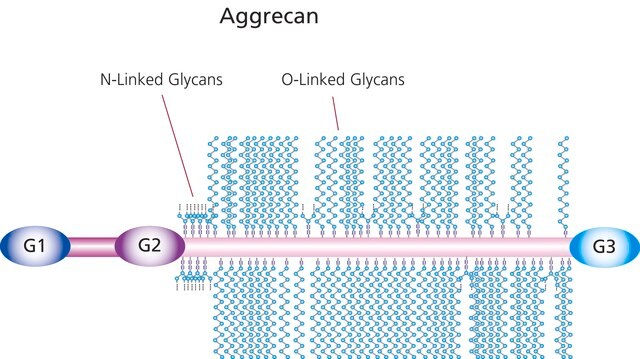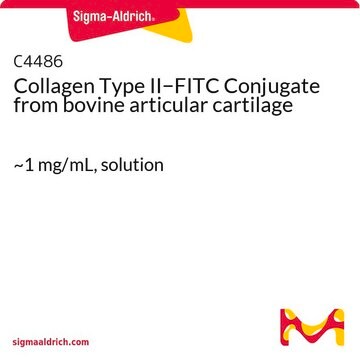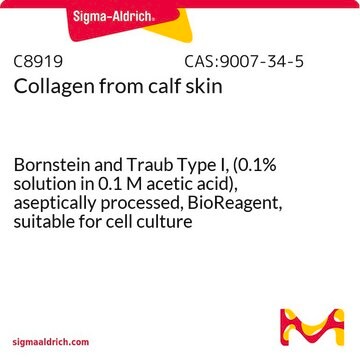C7806
Bovine Collagen Type II
from bovine nasal septum, powder, suitable for ELISA assays
Synonym(s):
Collagen from bovine
Sign Into View Organizational & Contract Pricing
All Photos(1)
About This Item
Recommended Products
Product Name
Collagen from bovine nasal septum, Bornstein and Traub Type II, powder
biological source
bovine nasal septum
Quality Level
form
powder
technique(s)
ELISA: suitable
solubility
aqueous acid: soluble
UniProt accession no.
storage temp.
2-8°C
Gene Information
bovine ... COL2A1(407142)
General description
Collagen is a fibrous protein, found in connective tissues, hard tissues, bone, dentin, cementum and also the mineralizing cartilage of the epiphyseal growth plate.
Collagen is classified into a number of structurally and genetically distinct types. We use the nomenclature proposed by Bornstein and Traub. Do not confuse Sigma type designations with recognized collagen classification types.
Application
Collagen from bovine nasal septum has been used to coat the plates to estimate the levels of serum anti-cII IgG by enzyme-linked immunosorbent assay (ELISA). It has also been used as a component in the emulsified agent to induce arthritis in rats.
Collagen-type II has been investigated for its importance in haemostasis. Two peptides, CB8 and CB11, are sites of platelet binding and activation on collagen-type 2. Collagen-type 2 has also been used as a model for arthritis in animals, where FR140423, a selective cyclooxygenase (COX)-2 inhibitor, has shown an anti-inflammatory effect without gastric lesions that may occur with treatment via indomethacin.
Collagen Type II is sometimes used to induce an animal model of rheumatoid arthritis. However, under conditions leading to formation of reactive oxygen species, the subjects develop tolerance for auto-antibodies. This is an unusual situation of ROS having a favorable effect.
Collagen Type II is sometimes used to induce an animal model of rheumatoid arthritis. However, under conditions leading to formation of reactive oxygen species, the subjects develop tolerance for auto-antibodies. This is an unusual situation of ROS having a favorable effect.
Biochem/physiol Actions
Collagen is the structural constituent of the dermis, which provides strength and support to the human skin. Variations in collagen participates in the aging process.
Preparation Note
An acid soluble collagen soluble in dilute acetic acid at pH 3.0 (5 mg/ml), yielding an opalescent, colorless solution.
Collagen Type II is a triple helix composed of three α1(II) strands.
Prepared by a modification of the pepsin extraction procedure of Niyibizi, et al., J. Biol. Chem., 259, 14170 (1984).
Storage Class Code
11 - Combustible Solids
WGK
WGK 1
Flash Point(F)
Not applicable
Flash Point(C)
Not applicable
Personal Protective Equipment
dust mask type N95 (US), Eyeshields, Gloves
Choose from one of the most recent versions:
Certificates of Analysis (COA)
Lot/Batch Number
Don't see the Right Version?
If you require a particular version, you can look up a specific certificate by the Lot or Batch number.
Already Own This Product?
Find documentation for the products that you have recently purchased in the Document Library.
Customers Also Viewed
The protective effects of chronic intermittent hypobaric hypoxia pretreatment against collagen-induced arthritis in rats
Shi M, et al.
Journal of Inflammation, 12(1), 23-23 (2015)
Aging and the skin
Brocklehurst's Textbook of Geriatric Medicine and Gerontology, 133-137 (2010)
Rui Liu et al.
Therapeutic advances in chronic disease, 12, 2040622321991705-2040622321991705 (2021-05-18)
Evidence has demonstrated that non-coding RNAs (ncRNAs) could be delivered efficiently to recipient cells using exosomes as a carrier. Additionally, long ncRNA nuclear enriched abundant transcript 1 (NEAT1) is emerging as a vital regulatory molecule in the progression of rheumatoid
From systemic T cell self-reactivity to organ-specific autoimmune disease via immunoglobulins
Korganow AS, et al.
Immunity, 10(4), 451-461 (1999)
Aspects of collagen mineralization in hard tissue formation
Wiesmann HP, et al.
International Review of Cytology, 242, 121-156 (2005)
Our team of scientists has experience in all areas of research including Life Science, Material Science, Chemical Synthesis, Chromatography, Analytical and many others.
Contact Technical Service











